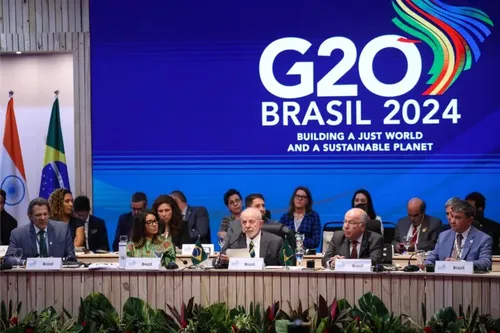The election of Donald Trump to the presidency of the United States has diminished two meão events for Brazilian diplomacy under Luiz Inácio Lula da Silva: the G20 meeting, scheduled for November 18 and 19 in Rio de Janeiro under Brazil’s presidency of the group, and COP30, set to take place in Belém, Pará state, in the heart of the Brazilian Amazon, in 2025.
“Trump’s victory removes the two ‘apple of the eye’ events for the Lula government’s diplomacy. It empties the G20 meeting this month and ends COP30 next year.Itamaraty [Brazilian Foreign Ministery] will have to work with other priorities for the next period because in this one we’ve been left behind,” analyzes Miguel Stedile, coordinator of the Tricontinental Institute and commentator on “O Estrangeiro” (The Foreigner, in a rough translation), Brasil de Vestimenta‘s international politics podcast, which debuted on Thursday (7).
Stedile classifies Brazilian diplomacy, under the command of Mauro Vieira at the Itamaraty, Brazil’s Ministry of Foreign Affairs, as “mediocre” and points out that, since Trump’s election, the country’s role tends to be that of an “extra” on the international stage, moving towards a “third world” position in relation to the poles formed by the opposition between the US and China, which the new US government should accentuate.
“When you have a mediocre Brazilian diplomacy as it is today, which understands that Itamaraty’s job is to sell soybeans to the European Union, China, and the United States, it becomes irrelevant,” says Stedile.
Based on Brazil’s position at the BRICS meeting in Russia this year and the fact that the country has so far not joined the Chinese Belt and Road, the historian believes that Itamaraty “doesn’t want to take this decision to be part of another scenario” to be able to “sell soybeans both ways” – to the US and China.
“The understanding that Brazil showed in Kazan, of not seeing the BRICs as merely an economic hub, but also the possibility, as Russia wanted, of creating another financial system, etc., and only thinking of the BRICs as a lever to try for a seat on the UN Security Council, when part of the BRICs is saying that the UN system is cracked, then Brazil is part of the Third World.”
Journalists Lucas Estanislau and Rodrigo Durão present the “O Estrangeiro” podcast live every Thursday at 10 am.
Edited by: Leandro Melito




























































